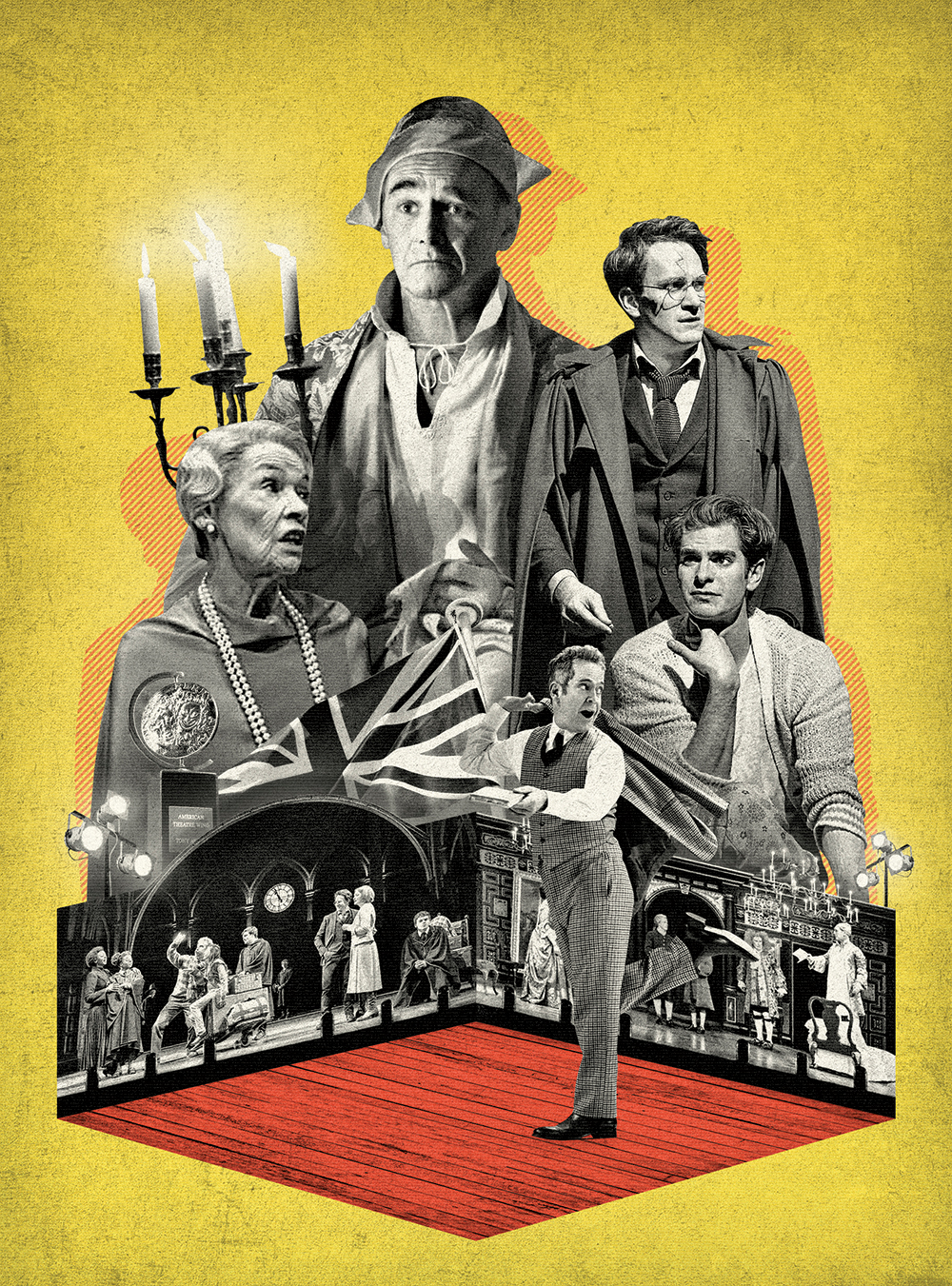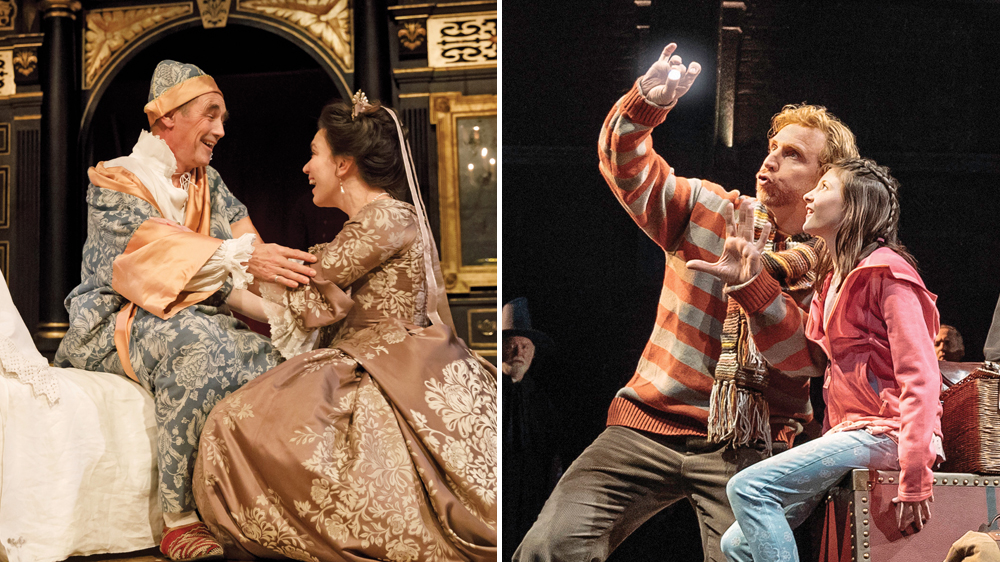Tony Nominees ‘Harry Potter’ and ‘Angels in America’ Reflect British Invasion
By Gordon Cox
LOS ANGELES (Variety.com) – Broadway is as American as apple pie — or at least as American as the Big Apple. But this year, a lot of the nominees for ’s biggest night have one thing in common: A British passport.
Of the shows nominated for best new play at the June 10 Tony Awards, three out of the five originated in London. The race for lead actor in a play is being run by four Britons and one American (or maybe 1.5, if you count dual citizen Andrew Garfield); the ratio’s the same in the competition for featured actress in a play. And the frontrunner for lead actress in a play? Glenda Jackson, who’s so British she used to be a member of Parliament.
There’s always been a transatlantic theater pipeline between New York and London, particularly for plays (think “Nicholas Nickleby” and “War Horse”), and the balance shifts from season to season. Last year all four new play nominees at the were written by living American writers. This year, U.S.-bred plays were sparse, and the biggest headline grabbers — two-part epics “,” setting a new record with 11 nominations, and “Harry Potter and the Cursed Child,” the leading candidate for new play with 10 — came from across the pond.
For a lot of this year’s Brit nominees, Broadway wasn’t even on the radar as a career goal, especially not for the ones who specialize in plays rather than musicals. But even on the other side of the ocean, Broadway beckons as a romanticized ideal, just as it does for Stateside theater fans.
Still, there’s always a little culture shock.
“It’s the epicenter of Western commercial theater. Why wouldn’t you want to come to Broadway?” asks Olivier winner Jamie Parker, who is nominated for lead actor in a play for his performance as the grown-up Boy Who Lived in “.”
“But Broadway’s daunting. It’s a big old machine. If it’s treating you nicely, it’s an incredible, beneficent power.”
He should know. “Harry Potter” is already a sold-out smash; his last New York outing, the Tony-winning 2006 transfer of National Theatre’s “The History Boys,” was equally successful. Parker and other nominees note that on Broadway, everything — from audience enthusiasm to awards-season hype — is outsize, doled out in generous American portions.
“There’s something about what Broadway represents and what the Tony Awards represent that just feels bigger,” says Tim Levy, a New York-based Brit who, as the director of the National Theatre’s Broadway producing arm, NT America, brought “Angels in America” to New York in partnership with U.S. backers including Jujamcyn Theaters’ Jordan Roth. “There’s a glamour to it. Americans celebrate success in a way that I find very honest and heartening. Brits are embarrassed by it, and it’s quite difficult for us.”
Also bigger on Broadway: the price tag. Transatlantic producers estimate that producing on Broadway can cost four times a show’s West End budget, due to a complicated tangle of factors including tight union regulations in the U.S. But the potential income yielded by a hit is that much higher, too.
“Everything is on a multiple of four or five on Broadway: risk, reward, response,” says Sonia Friedman, who lead produces “Harry Potter” with Colin Callender. She has a long history of working on both sides of the pond, with titles including “Noises Off,” “The Norman Conquests,” “Jerusalem” and “Farinelli and the King” (the current candidate for best play that earned an acting nomination for Mark Rylance).
She’s also had plenty of experience with the Tonys — the annual awards celebration that, in New York, plays a leading role in a production’s success.
“The Tonys cast a shadow over a lot of the strategic thinking on Broadway in a way that the Oliviers don’t in London,” Callender points out. “They determine all sort of aspects of the strategy, least of which is the actual timing of things.”
On Broadway, the majority of award hopefuls target an opening in March or April, so as to be fresh in the minds of Tony voters.
That’s because a big win at the Tonys, especially for a new musical, can turn a struggling show into a slam dunk. “The Tonys can have a massive effect on the box office,” says “Harry Potter” director John Tiffany. “I’ve seen that first-hand with ‘Once.’”
That musical, his first Broadway credit, carved out a three-year run with the help of major Tony wins in 2012.
The Tony Awards ceremony itself — and its national telecast, something no theater awards show gets in the U.K. — also strikes Brits as supersized.
“I’m blown away by the scale of the Tonys,” says Harry Hadden-Paton, nominated for his performance as Henry Higgins in the revival “My Fair Lady” (10 nominations). “You guys don’t do understatement.”
Well, no. But the U.K. creatives who find themselves in the Tony spotlight seem to enjoy it as much as they’re gobsmacked by it. For them, both the Tonys and Broadway have an appeal that carries all the way to London.
“Broadway means a lot to anyone working in the theater industry, across the world,” says Marianne Elliott, the two-time Tony winner (“War Horse,” “The Curious Incident of the Dog in the Night-Time”) up for a third for her staging of “Angels in America.” “It is seen as a mecca to a lot of us. Plus it feels so glamourous and so alluring! I mean it’s New York! It’s Broadway!”
“The grass is always greener, isn’t it?” says Tom Hollander, in the race for lead actor in a play for his work in the nominated revival “Travesties.” “New York is a miracle in itself, and to be here and to be working in the theater community is a very exciting thing to do for a British actor.”
For Brits — as for the rest of the world — the Broadway brand rests squarely on the shoulders of its razzle-dazzle tuners. “I think where Broadway features in the British imagination is probably the musicals aspect of it,” says Jackson, the Tony frontrunner for “Three Tall Women.” “They really taught us how to do musicals. And of course, all the films that we’ve all seen which are centered around Broadway.”
Denise Gough, up for featured actress in a play for “Angels in America,” agrees. “To me Broadway was the home of musicals, and then Off Broadway was where really cool plays happened,” she says. The success of “Angels” has helped her realize that “it just so happens you can do cool plays on both.”
Even given all the challenges specific to Broadway — the skyrocketing costs, the dictatorship of the Tonys, an ongoing real-
estate squeeze — producers say they just can’t quit New York.
“I bloody love it,” Friedman says. “It’s a producer’s town. It’s where I am most challenged, in terms of the business versus the creative. It tests me like no other place in the world. And as a result, when something works on Broadway, the sense of achievement is that much greater.”
Nearly all this year’s transatlantic nominees cite the close-knit nature of the Broadway community as a welcome discovery for them. Garfield, nominated for lead actor in “Angels in America,” is experiencing life in a successful play for the second time, after his Tony-nominated turn in “Death of a Salesman” in 2012. “When you’re in a show that’s well-received, you get kind of embroidered into the fabric of the city,” he says. “You feel very welcome.”
“Part of the glamour of Broadway is the community,” echoes Noma Dumezweni, the Olivier winner who is now Tony-nominated for her turn as Hermione in “Cursed Child.” “Everyone knows everyone on Broadway, and we’re all in this thing together, and there is a lovely feeling about that.”
That local fellowship is one of the main reasons so many actors want to come back. “Broadway was never really an ambition or anything, but after coming here, I’ve realized that it’s the best f—in’ place in the world,” says Dumezweni’s co-star and fellow nominee Anthony Boyle, who plays Scorpius Malfoy in “Cursed Child.” “The audiences and the energy and the community are just so uplifting. I never want to leave. I just want to do Broadway my whole life!”
Tipsheet
What: Tony Awards
When: 8 p.m. ET, June 10
Where: Radio City Music Hall, New York
Web: Tonyawards.com


